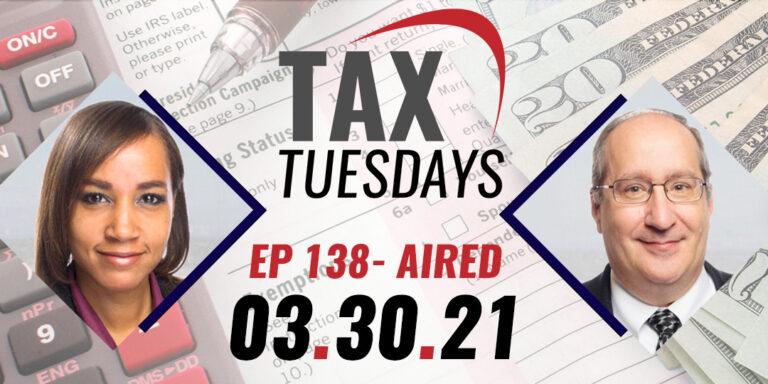What Is a Tax Credit? What Types of Tax Credits You Should Know About
In this episode of Toni Talks, enrolled agent (EA) Toni Covey is joined by special guests Eliot Thomas and Amanda Wynalda, both attorneys, to discuss tax credits and how to qualify.
Updated November 24, 2020
When I speak with clients, one thing that comes up frequently is tax credits. When it comes to tax credits, it’s usually one of those things where you either qualify or you don’t, it depends on your situation. But first, let’s back up a bit and look more generally at tax credits versus tax deductions.
Understanding Tax Credits vs. Deductions
There is some confusion out there about the differences between tax credits and tax deductions, so it’s worth breaking down and comparing the two.
A tax deduction reduces your taxable income. A deduction takes your taxable income and reduces it by that amount. The net result of a tax deduction is that your taxes are lowered because the amount of taxable income you have is decreased.
A tax credit, on the other hand, reduces the taxes you owe. A tax credit takes whatever taxes you owe and reduces it dollar-for-dollar by the credit amount. The net result of a tax credit is that your taxes are lower, period.
In short: you want a tax credit. Tax deductions are great, too, but tax credits are even better.
Refundable vs. Nonrefundable Tax Credits
In a big-picture sense, tax credits come in two flavors: refundable and nonrefundable. Both lower your taxes owed dollar-for-dollar, but only refundable credits could result in a tax refund. For instance, if you owe $1,000 in taxes but qualify for a refundable tax credit of $1,500, you would likely receive a refund of $500. If you owe $1,000 in taxes but qualify for a nonrefundable tax credit of $1,500, your tax liability would be reduced to $0, but you wouldn’t receive a refund.
Types of Tax Credits
There are a ton of tax credits out there, some of which are quite obscure and aren’t often utilized. For our purposes today, however, I want to focus on the most common tax credits: what the credit is, what it’s for, and any limitations.
Types of Nonrefundable Tax Credits
Foreign Tax Credit
One of the first nonrefundable tax credits that come to mind is the foreign tax credit. The foreign tax credit comes into play if you have income that you earned overseas or in a different country. The foreign tax credit basically represents the US acknowledging that you may have already paid taxes on that income, so you aren’t double-taxed. If you earn income outside the US, you should absolutely look into using this tax credit, but note that the foreign tax credit does not apply to all countries. It’s only applicable to countries with whom the US has a tax treaty.
Child Tax Credit
Before the Tax Cuts and Jobs Act (TCJA) was enacted in 2018, the child tax credit was $1,000 per child, and the income cap was quite low. This prevented many higher earners from seeing the benefit of this credit. TCJA changed the child tax credit in two significant ways. First, it doubled the credit from $1,000 to $2,000 per child. Second, it increased the income threshold to around $400,000 for married joint-filers or around $200,000 for single filers.
Dependent Care Credit
The child tax credit goes hand-in-hand with the dependent care credit. If you have someone living with you who you’re related to and you provide more than 50% of their support, then you’re entitled to a $500 credit per dependent. Children stop being eligible for the child tax credit in the tax year in which they turn seventeen. Instead, at seventeen, you can take the dependent care credit for them.
Lifetime Learning Credit
Another nonrefundable credit is the lifetime learning credit. This is a credit of $2,000 that applies to any qualified education, including undergraduate, graduate, or continuing education at a higher education institution.
Types of Refundable Tax Credits
This is a nice segue into our refundable tax credits. Let’s start with the American opportunity credit.
American Opportunity Credit
The American opportunity credit differs from the lifetime learning credit because it’s only applicable to your first four years of higher education. This is a credit for a maximum of $2,500 per eligible student. If the credit brings your tax liability to $0, up to 40% of that credit is refundable ($1,000 maximum).
It’s worth noting that these amounts are only applicable to your first student. After that, the credit is $2,000 and 25% of it is refundable. Furthermore, this credit phases out, which means that, as your income goes up, the credit gets smaller. Once your income exceeds the cap, you’re ineligible.
Earned Income Credit
The earned income credit is solely based on the amount of your income. Many of our clients assume they’re ineligible for this credit because their income is too high. However, it’s important to note that, while your C-corporation may be doing fantastic, the wages you pay yourself coming from the corporation may be lower. The earned income credit is a highly scrutinized credit, so it’s important to make sure all the details are in order.
Partially Refundable: the Child Tax Credit
We already discussed that the child tax credit is a nonrefundable tax credit of up to $2,000 per child. However, this credit is actually partially refundable, up to $1,400. So, if the child tax credit of $2,000 per child reduces your tax liability to $0, you could actually see a refund of $1,400 per child beginning in 2019 (up to certain limitations).
The Takeaway
Ultimately, making the most out of all these tax credits in conjunction with your entity structure requires careful planning. This is where tax planning becomes so critical. One wrong move or oversight could cost thousands in unnecessary taxes.
If you’d like to discuss your tax planning strategies with a Certified Professional Advisor, I encourage you to claim your complimentary Strategy Session today. On the call, you and a Senior Advisor will discuss your individual facts and circumstances, then work together to build the best customized entity structure for your individual needs and goals. You can schedule online or by calling 888.871.8535.
Free Strategy Session with an Anderson Tax Advisor
Tax Attorneys, CPAs & EAs who specialize in working with businesses and investors. Speak with an Anderson Professional Advisor to get your FREE Tax Plan Strategy Session. Limited-Time offer: FREE (a $750 value.)











